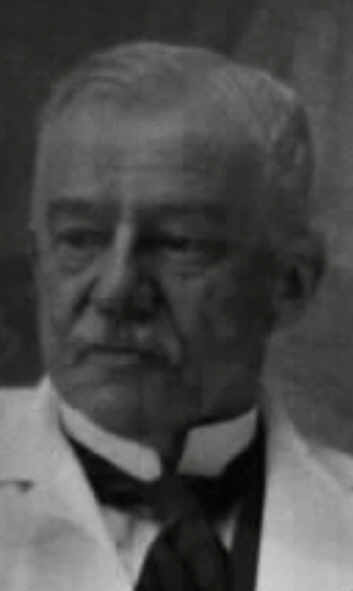Howard Atwood Kelly
Howard Atwood Kelly (February 20, 1858 – January 12, 1943) was an American gynecologist and one of the founding professors of Johns Hopkins Hospital. He is credited with establishing gynecology as a specialty by developing new surgical approaches to women's diseases and by being an early adopter of radium to treat cancer. Kelly's contributions to medical science and education have left a lasting legacy in the field of gynecology and obstetrics.
Early Life and Education[edit | edit source]
Howard Atwood Kelly was born in Camden, New Jersey, to a well-established family. He pursued his undergraduate education at the University of Pennsylvania, where he developed an interest in the medical field. Following his graduation in 1877, Kelly entered the University of Pennsylvania's Medical School, earning his medical degree in 1882.
Career[edit | edit source]
After completing his medical degree, Kelly traveled to Europe to further his education in gynecology. Upon his return to the United States, he began practicing in Philadelphia. In 1889, Kelly was invited by William Osler to join the newly established Johns Hopkins Hospital as the first professor of gynecology and obstetrics. This position allowed him to significantly influence the development of the field.
At Johns Hopkins, Kelly introduced several innovative surgical techniques and instruments. He was among the first in the United States to use cystoscopy, a diagnostic procedure that allows the examination of the bladder. Kelly also developed new surgical approaches to treat uterine fibroids and other gynecological conditions, significantly improving patient outcomes.
Contributions to Cancer Treatment[edit | edit source]
Kelly's interest in cancer treatment led him to become an early adopter of radium for treating malignancies. He recognized the potential of radium to shrink tumors and alleviate symptoms, making significant contributions to the nascent field of radiation therapy. His work in this area helped lay the groundwork for modern cancer treatments.
Legacy[edit | edit source]
Howard Atwood Kelly's legacy in medicine is marked by his pioneering contributions to gynecology and cancer treatment. He authored numerous medical texts and articles, sharing his knowledge and innovations with the medical community. Kelly's commitment to medical education also led him to mentor many young physicians, who continued his work in improving women's health care.
Kelly was a devout Christian, and his faith influenced his approach to medicine and patient care. He believed in treating the whole patient, integrating spiritual and emotional well-being with physical health.
Death and Honors[edit | edit source]
Howard Atwood Kelly passed away on January 12, 1943. His contributions to medicine have been recognized by numerous awards and honors, both during his lifetime and posthumously. The Howard A. Kelly Society at Johns Hopkins University, named in his honor, continues to support gynecology and obstetrics education and research.
Search WikiMD
Ad.Tired of being Overweight? Try W8MD's physician weight loss program.
Semaglutide (Ozempic / Wegovy and Tirzepatide (Mounjaro / Zepbound) available.
Advertise on WikiMD
|
WikiMD's Wellness Encyclopedia |
| Let Food Be Thy Medicine Medicine Thy Food - Hippocrates |
Translate this page: - East Asian
中文,
日本,
한국어,
South Asian
हिन्दी,
தமிழ்,
తెలుగు,
Urdu,
ಕನ್ನಡ,
Southeast Asian
Indonesian,
Vietnamese,
Thai,
မြန်မာဘာသာ,
বাংলা
European
español,
Deutsch,
français,
Greek,
português do Brasil,
polski,
română,
русский,
Nederlands,
norsk,
svenska,
suomi,
Italian
Middle Eastern & African
عربى,
Turkish,
Persian,
Hebrew,
Afrikaans,
isiZulu,
Kiswahili,
Other
Bulgarian,
Hungarian,
Czech,
Swedish,
മലയാളം,
मराठी,
ਪੰਜਾਬੀ,
ગુજરાતી,
Portuguese,
Ukrainian
Medical Disclaimer: WikiMD is not a substitute for professional medical advice. The information on WikiMD is provided as an information resource only, may be incorrect, outdated or misleading, and is not to be used or relied on for any diagnostic or treatment purposes. Please consult your health care provider before making any healthcare decisions or for guidance about a specific medical condition. WikiMD expressly disclaims responsibility, and shall have no liability, for any damages, loss, injury, or liability whatsoever suffered as a result of your reliance on the information contained in this site. By visiting this site you agree to the foregoing terms and conditions, which may from time to time be changed or supplemented by WikiMD. If you do not agree to the foregoing terms and conditions, you should not enter or use this site. See full disclaimer.
Credits:Most images are courtesy of Wikimedia commons, and templates, categories Wikipedia, licensed under CC BY SA or similar.
Contributors: Prab R. Tumpati, MD




